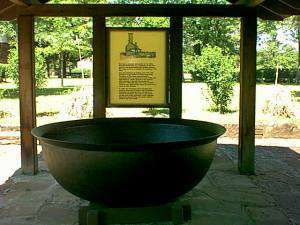Sequoyah's Salt Works
category : Ethnic Heritage
 Salt was a valuable commodity in the early 1800s. Besides being used as a seasoning, it was also used in food preparation and leather tanning. Salt also served as a medium of exchange in the West.
Salt was a valuable commodity in the early 1800s. Besides being used as a seasoning, it was also used in food preparation and leather tanning. Salt also served as a medium of exchange in the West.Salt was obtained by boiling water from salt springs in large kettles set atop wood-fired furnaces. As the water evaporated, the crystalized salt was ladled out of the kettle and deposited on a lower portion of the furnace. After cooling it was put into barrels for shipment. Although most salt made in Indian Territory was used locally, some was sold as far away as New Orleans.
In 1828, the Cherokees were removed from western Arkansas to present day Oklahoma. Sequoyah, in exchange for a salt works he owned in Arkansas, was given a salt spring located nine miles northeast of his homesite.
Sequoyah operated this salt works until his death in the 1840s.
Sequoyah's Home Site
Admission: ADMISSION FREE
Hours: Tuesday through Friday, 9:00 am to 5:00 pm
Saturday and Sunday, 2:00 to 5:00 pm
CLOSED: Monday and State Holidays
Address: North from Sallisaw on U.S. 59 ( 3 miles), then east on State Hwy. 101 (7 miles)
Phone: 918-775-2413
Come visit us in Sallisaw, Oklahoma
